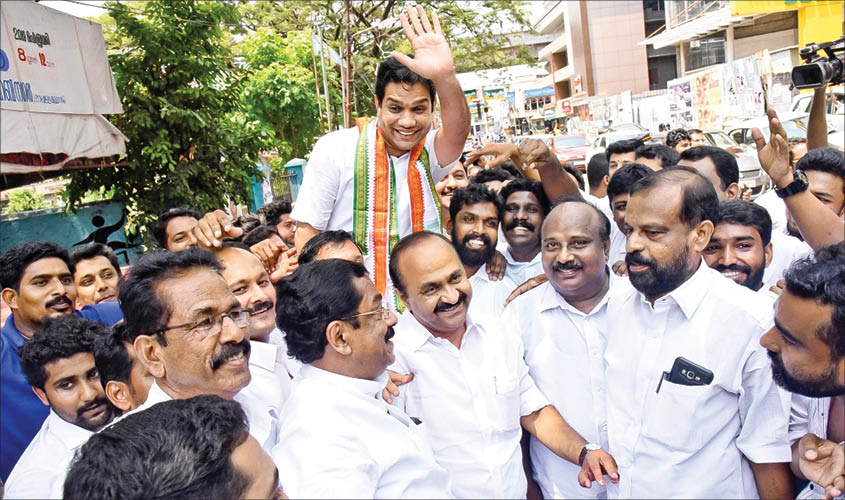Instead of going for either BJP or LDF, Kerala sees Congress as trustworthy.
New Delhi: Kerala has done it once again, disagreeing to agree with the rest of the country. In post-Emergency 1977, when almost the entire country rejected Indira Gandhi and her Congress party, Kerala sent 11 Congressmen to the sixth Lok Sabha, one of the few states which gave the late Prime Minister’s party a two-digit figure in that general election. Forty-two years later, when almost the entire country has voted for Narendra Modi and his Bharatiya Janata Party, Kerala thought it prudent enough to say “No” by voting en masse for the Congress-led United Democratic Front, which has won 19 of the 20 seats in the state. More than a vote against the ruling CPM, which has just about managed to win one seat from the state, this time it was definitely the anti-Modi, anti-BJP sentiment than ran across the state, propelling a Congress sweep. On hindsight, the senior-most Congress leader from Kerala, A.K. Antony has proved right. Just two days before the state went to polls on 23 April, Antony had said that “election results of 1977 will be repeated…and there will be an anti-Modi, anti-Pinarayi wave in the state”.
By not voting for the CPM-led Left Democratic Front, Kerala has once again proved that when it comes to national politics and interests of the state, it trusts Congress more than any other party, “especially in the face of rising fascist forces in the country”, as Pradesh Congress president Mullappally Ramachandran put it. But the Congress should partially thank Narendra Modi and his party president Amit Shah for this spectacular victory. Had the BJP not unleashed such a “divisive” campaign—remember Shah even openly wondered whether Wayanad was in Pakistan—in the state, there would not have been a consolidation of the minority vote as this time.
Nevertheless, it will be a challenge, if not a matter of serious concern, for the ruling CPM and the Congress that the BJP, though it has not won a seat from the state as expected by its leadership in the wake of the party’s emotional, though at times violent, Sabarimala campaign, has succeeded in increasing its vote share. It is likely to touch the 20% mark, a 5% increase from the 2016 Assembly elections. However, from the point of view of BJP’s national leadership, the news from Kerala is a big disappointment, especially when compared to its sterling performance in West Bengal. Daggers are already out, with many senior leaders in the state openly blaming the state leadership for this proverbial slip between the cup and the lip. Many say it is unacceptable that the party has slipped into third position in Pathanamthitta, where Sabarimala is situated. Other than Thiruvananthapuram, this was where the party had pinned its hopes. Accusations are being raised against certain leaders of “sabotaging” the chances of K. Surendran, the party’s candidate there, who was the most vocal during the Sabarimala agitation. This has brought the RSS-BJP divide to the fore.
There is every possibility of a change of leadership in the state in the coming weeks, perhaps after the formation of the Modi government. The current president P.S. Sreedharan Pillai will have to go. Now many in the party say that Pillai’s comment that Sabarimala was a “golden opportunity” for the party was a big blunder in the sense that many devotees thought that BJP was using them as a pawn to gain political mileage. V. Muraleedharan, a former state president, who currently represents Maharashtra in the Rajya Sabha, heads the strongest faction in the state unit. He is likely to pip Kummanam Rajashekharan to the Union Cabinet. In that case, Kummanam may return as party president. It could be the other way round also, since Kummanam had to give up his Governor’s post to contest the election. One thing is sure: Sabarimala will continue to top BJP’s agenda in the state.
Many would like to consider the victory of Congress as the beginning of the end of CPM in the state, as is the case of the communist movement in West Bengal and Tripura. Such a possibility cannot be ruled out, if CPM is not willing to learn from the mistakes of the past. Chief Minister Pinarayi Vijayan and Company cannot absolve themselves from the responsibility in paving the way for the phenomenal growth of the BJP in the state. The party is unlikely to admit the same. But the fact remains that Pinarayi’s “line” of bringing together all lower castes against the Nair community in the name of renaissance and in a way justify his government’s “highhandedness” in Sabarimala has boomeranged. The Nairs, especially women members of the community, have come out in large numbers to register their resentment against Pinarayi government’s actions post the September Supreme Court judgement allowing the entry of women of all ages into the Lord Ayyappa shrine. In that sense, the verdict is against Chief Minister Pinarayi Vijayan too, though CPM would love to brand it as anti-Modi alone.
But the writing on the wall is clear. For the time being Kerala may have outright stalled Narendra Modi and BJP from making inroads into the state.
It may not be the case next time around.

